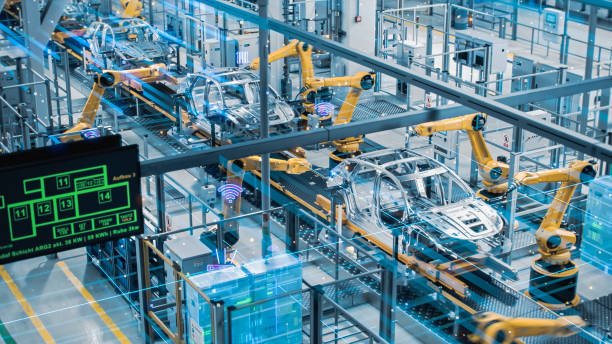Modular Manufacturing: Revolutionizing Production Flexibility
In today's rapidly evolving industrial landscape, businesses are constantly seeking innovative ways to enhance production efficiency and adapt to changing market demands. Modular manufacturing has emerged as a groundbreaking approach that promises to revolutionize the way products are designed, produced, and delivered. This flexible manufacturing strategy allows companies to respond swiftly to market fluctuations, reduce costs, and streamline operations.

The Foundations of Modular Manufacturing
Modular manufacturing is rooted in the concept of modularization, which involves dividing a product or process into smaller, standardized units or modules. These modules can be designed, manufactured, and assembled independently, allowing for greater flexibility and customization in the production process. The origins of modular manufacturing can be traced back to the early 20th century, with Henry Ford’s revolutionary assembly line serving as a precursor to modern modular techniques.
Over the decades, modular manufacturing has evolved significantly, incorporating advanced technologies and management practices. The rise of computer-aided design (CAD) and computer-aided manufacturing (CAM) in the 1980s and 1990s further accelerated the adoption of modular principles, enabling more precise and efficient module design and production.
Key Principles of Modular Manufacturing
Modular manufacturing is built on several fundamental principles that distinguish it from traditional manufacturing approaches:
-
Standardization: Modules are designed to be interchangeable and compatible with various product configurations.
-
Flexibility: The ability to quickly reconfigure production lines to accommodate different product variations or entirely new products.
-
Scalability: Easy expansion or contraction of production capacity by adding or removing modules.
-
Parallel Processing: Multiple modules can be produced simultaneously, reducing overall production time.
-
Simplified Maintenance: Individual modules can be easily replaced or upgraded without disrupting the entire production line.
Benefits and Challenges of Modular Manufacturing
The implementation of modular manufacturing offers numerous benefits to businesses across various industries:
-
Increased Flexibility: Companies can quickly adapt to changing market demands by reconfiguring their production lines.
-
Reduced Time-to-Market: Parallel processing of modules accelerates product development and production cycles.
-
Cost Efficiency: Standardization of components and processes leads to economies of scale and reduced inventory costs.
-
Improved Quality Control: Each module can be tested independently, ensuring higher overall product quality.
-
Enhanced Customization: Modular design allows for easier product customization to meet diverse customer needs.
However, transitioning to modular manufacturing also presents several challenges:
-
Initial Investment: Implementing modular systems often requires significant upfront costs for redesigning products and processes.
-
Complexity Management: Coordinating the design and production of multiple modules can be logistically challenging.
-
Standardization vs. Innovation: Striking the right balance between standardization and innovation can be difficult.
-
Supply Chain Coordination: Ensuring seamless integration of modules from various suppliers requires robust supply chain management.
Industries Embracing Modular Manufacturing
Modular manufacturing principles are being adopted across a wide range of industries, each tailoring the approach to their specific needs:
-
Automotive: Car manufacturers are using modular platforms to produce multiple vehicle models on the same production line, reducing costs and increasing flexibility.
-
Electronics: Companies in the electronics industry are leveraging modular design to create customizable devices and streamline production processes.
-
Construction: Modular construction techniques are revolutionizing the building industry, allowing for faster, more efficient, and sustainable development projects.
-
Aerospace: Aircraft manufacturers are adopting modular approaches to reduce complexity and improve maintenance efficiency in aircraft design and production.
-
Furniture: The furniture industry is embracing modularity to offer customizable, easily transportable products that cater to changing consumer preferences.
Future Trends in Modular Manufacturing
As technology continues to advance, the future of modular manufacturing looks promising. Several trends are likely to shape its evolution:
-
Integration with Industry 4.0: The convergence of modular manufacturing with technologies like IoT, AI, and big data analytics will further enhance flexibility and efficiency.
-
Sustainable Manufacturing: Modular approaches will play a crucial role in developing more sustainable and circular production models.
-
Distributed Manufacturing: Modular systems will enable the creation of smaller, localized production facilities closer to end consumers.
-
Advanced Materials: The development of new materials will expand the possibilities for modular design and manufacturing across industries.
-
Collaborative Robotics: The integration of collaborative robots (cobots) in modular production lines will further increase flexibility and efficiency.
Practical Strategies for Implementing Modular Manufacturing
• Conduct a thorough analysis of your current production processes to identify areas suitable for modularization.
• Invest in employee training to ensure smooth adoption of modular manufacturing principles.
• Start with pilot projects to test and refine your modular approach before full-scale implementation.
• Collaborate with suppliers to develop standardized, modular components that align with your production needs.
• Implement advanced software solutions for efficient module design, production planning, and inventory management.
• Regularly assess and optimize your modular manufacturing system to ensure continued efficiency and relevance.
In conclusion, modular manufacturing represents a paradigm shift in industrial production, offering unprecedented flexibility, efficiency, and customization capabilities. As businesses continue to face challenges in an increasingly dynamic global market, embracing modular principles could be the key to staying competitive and driving sustainable growth. By understanding the foundations, benefits, and challenges of modular manufacturing, companies can make informed decisions about implementing this innovative approach in their operations. As technology evolves and industries adapt, modular manufacturing is poised to play a central role in shaping the future of industrial production.




